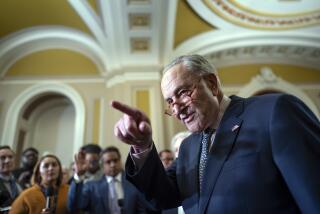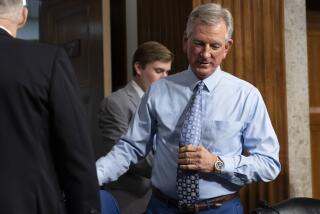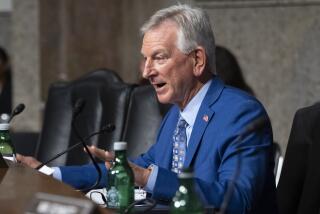Scandal Derailed Plans for Ground Commander in Iraq
WASHINGTON — The Abu Ghraib prison abuse scandal upset Pentagon plans to reshuffle a group of generals this summer, leaving Lt. Gen. Ricardo Sanchez, the top ground commander in Iraq, without a clear-cut assignment, officials said Tuesday.
Defense officials had planned to shift Sanchez as well as the Army’s vice chief of staff and a top aide to Defense Secretary Donald H. Rumsfeld into new positions. But they were forced to tear up the plan and start over after the prison scandal grew, creating political and operational obstacles, officials said.
Sanchez was to take over the Southern Command, a post in which he would have overseen U.S. forces throughout Central and South America and the Caribbean, according to a senior Defense official who spoke on condition of anonymity.
That job requires Senate confirmation, a process that Defense officials feared would drag on because of continuing congressional questions about how some members of the U.S. military treated detainees in Iraq. Though not faulting Sanchez, a three-star general, Defense officials said that lingering questions might have delayed Senate approval of the fourth star required for the higher command.
“This is not reflective of Sanchez’s role in any of this,” the senior Defense official said. “It’s just prudent, common sense that you’re not going to get him through the confirmation process until next year. So now what do you do with SouthCom? Once you pull someone out, the whole daisy chain shifts.”
Under the original Pentagon plan, Lt. Gen. Bantz J. Craddock, a three-star general who is a close Rumsfeld ally and aide, was to be nominated for a fourth star and would have taken over a command in Iraq. With Sanchez temporarily sidelined, Pentagon officials opted to send Craddock to the Southern Command and send four-star Gen. George W. Casey, the second-in-command of the Army, to head a new, higher-ranked billet that will replace Sanchez’s post in Iraq. Assignments of three- and four-star officers must be approved by the Senate.
Other military sources suggested that revisions in the current Pentagon plan for the generals were still possible. Under a scenario outlined by a former military official familiar with the plan to turn over sovereignty to Iraq next month, Craddock would take Casey’s post as the No. 2 uniformed Army official and Pentagon officials would continue to press Sanchez for the SouthCom post, relying on his appeal as the highest-ranking Latino in the military.
In either case, the delicate minuet would shift Casey out of the Army’s No. 2 uniformed post after less than a year, and put a respected commander in Iraq, the most sensitive command outside the United States. Casey has worked with Rumsfeld as director of the Joint Staff since January 2003 and has allies on Capitol Hill. Although Pentagon officials have insisted that the shuffle is part of normal rotation of officers, it comes as the administration is suffering from sinking approval ratings at home and waves of criticism abroad.
“If something isn’t working and you think the strategy is sound, the logical assumption is that the people who are executing it are the problem,” said analyst Loren Thompson of the Lexington Institute, an Arlington, Va., public policy group.
Sanchez, who rose from poverty to become a high-ranking Army officer, has won loyal allies among his colleagues. Raised two miles from the Mexican border in Rio Grande City, Texas, Sanchez was recently named by Hispanic magazine as Hispanic of the Year.
“I would just say that Rick Sanchez has had the hardest job in the U.S. Army over the last year-plus,” said retired Army Maj. Gen. William Nash, now a military analyst at the Council on Foreign Relations in Washington. “And that he’s been faced with trying to make a coherent operation out of a lot of incoherent parts.”
Nash said Sanchez, who also has endured criticism for the rekindled Iraqi insurgency, had to deal with insufficient numbers of troops, shifting political guidance and the U.S.-led Coalition Provisional Authority, which Nash said was “less than fully organized and fully in command.”
Military officials hope a new command structure will improve communication between the military leadership in Iraq and the U.S. civilian presence, which will be transformed from the occupation authority to an embassy.
Military and civilian officials in Baghdad and Washington have described persistent friction between L. Paul Bremer III, the U.S. civilian administrator in Iraq, and the military leaders -- Sanchez and his superior, Gen. John Abizaid, head of the U.S. Central Command.
“Now, it couldn’t be worse,” said one official who recently left the coalition authority, speaking on condition of anonymity. “Nobody talks to anybody.”
More to Read
Sign up for Essential California
The most important California stories and recommendations in your inbox every morning.
You may occasionally receive promotional content from the Los Angeles Times.










